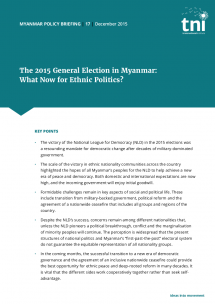Ideas into movement
Boost TNI's work
50 years. Hundreds of social struggles. Countless ideas turned into movement.
Support us as we celebrate our 50th anniversary in 2024.

Although the elections were peaceful, significant conflict continued in parts of the Shan and Kachin states. The expectations on the new government are extraordinarily high and all of the challenges facing the country remain as difficult to address as ever.

Despite huge challenges, election day in Myanmar passed almost entirely peacefully. Aung San Suu Kyi’s National League for Democracy triumphed in polls that were regarded by domestic and international observers as remarkably free from irregularities. The scale of the victory, and the apparent willingness of the current government and military authorities to ensure an orderly transfer of power in the coming months, opens up the potential for an optimistic new chapter in Myanmar’s post-independence history.
The hopes and expectations on the new government are extraordinarily high. Yet all of the challenges facing the country remain as difficult to address as ever. One of the most integral to the country’s future will be dealing with the legacy of decades of political divisions, ethnic exclusions and armed conflict that have continued since Myanmar’s independence in 1948. Although the elections themselves were peaceful, significant conflict continued in parts of the Shan and Kachin states, with attacks by the national armed forces (Tatmadaw) unusually intense both before and after the polls. Adding to this uncertainty, while the poll results reflected the nationwide popularity of the NLD, the scale of the NLD landslide under the country’s “first-past-the- post” electoral system has left most ethnic-based political parties with few seats, or none at all.